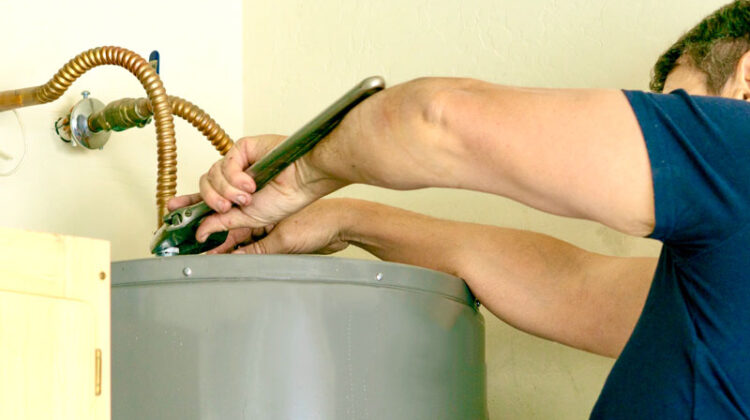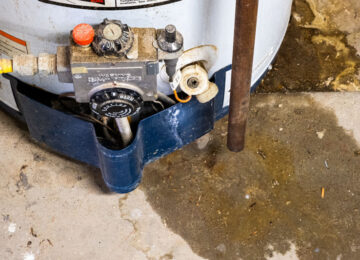Geothermal Energy — It’s More Than Just Hot Air
The life expectancy of a water heater is about eight to 12 years, but you can increase its longevity by taking precautions such as draining and flushing the tank every six months. Hot water heaters usually last between 10 and 15 years, though increased insulation may increase their lifespan to 20–25 years.
Water Heater Replacement Factors
– Where the unit is located – If your hot water heater is located in a basement or utility room, it will experience temperature fluctuations throughout the day that shorten its lifespan. Units that sit outside — either on a cement pad or on your home’s exterior wall — are less affected by temperature changes.
– How well it was installed – The more tightly the tank fits into your home’s framework, the better protected it is from temperature fluctuations. A unit that is not properly fitted or solidly attached to the home’s frame may experience more vibrations and water pressure changes.
– Quality of installation – Hot water heaters must be securely fastened to prevent them from falling forward, which could damage connections between it and your home’s plumbing system. If your hot water heater has never been secured, you should evaluate its stability regularly.
– Maintenance schedule – The tank requires an annual inspection by a professional plumber, who will flush out sediment at the bottom of the tank at least once every year; this ensures that it can deliver enough warm water until the end of its useful life.
– Water quality – Hard water limits how long some models can last because calcium build up on the tank’s interior surface reduces the unit’s ability to retain heat.
– Unit leaks – Hot water tanks that are not properly supported or installed may develop dangerous cracks, which increase the risk of gas and water leaks. – Outdoor units are more likely to incur damages from hail, tree branches, high winds, lightning strikes, tornadoes, hurricanes and floods.
How Long Do All Types of Hot Water Heaters Last?
Tankless hot water heaters will last 20 years or more if they are regularly serviced by a professional plumber who drains out minerals and sediments continually trapped inside its chamber. They require less energy because there is no storage tank but take longer to deliver highly heated water than other models do.
Gas Storage Hot Water Heaters
The typical gas storage tank hot water heater lasts between 8 and 12 years. It is considered one of the more efficient models on the market, but it cannot preheat water as well as some other types can.
On demand Hot Water Heater
An electric on-demand or tankless water heater uses 30% less energy than traditional gas storage tanks do, but they will only last between eight and 10 years because of frequent heating cycles that gradually wear down internal components. If you do not use your dishwasher or washing machine often enough to warrant installing an on-demand model, you should consider upgrading to a dual-element unit that combines both technologies in one device. Electric Dual Hot Water Heater
A standard electric hot water heater lasts between 10 and 15 years. It can deliver preheated water within seconds but does not save much energy unless you have a low-flow plumbing system that typically limits its use to smaller homes or apartments.
Solar Hot Water Heater
A solar hot water heater is one of the most efficient options on the market because it heats up water using free sunlight, but it costs more to install than other types do. Solar power is also only available in certain areas of the country where there are high levels of direct sunlight year-round. If you live somewhere with insufficient solar resources, you should consider installing an energy-efficient gas storage tank model instead.
Mobile Home Hot Water Heater
Water heaters for mobile homes come in both gas and electric models. The units that use gas are more efficient because they can produce hot water within seconds, but they do not work well in places where the temperature drops below freezing. The electric ones take longer to heat up water, but they can get through extremely cold weather without having to turn on and off repeatedly.
If you live outside the United States or Canada, your country may have different types of heating systems that qualify for tax credits like the Residential Energy Efficient Property Credit (income tax credit) . To find out if this incentive is available in your locale, contact your city’s or state’s department of housing development .
How Can Replacing Hot Water Heating Systems Save Money?
Hot water heater replacements are one of the most cost-effective energy upgrades you can make to your home. Replacing a damaged or inefficient system typically costs between $900 and $3,000 , but the long-term benefits of this investment include significant savings on heating bills. In addition, you will save between 10% and 15% on water heating costs because modern models are more energy efficient than older ones.



